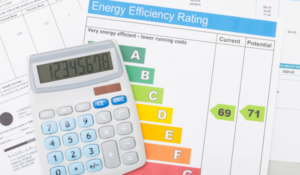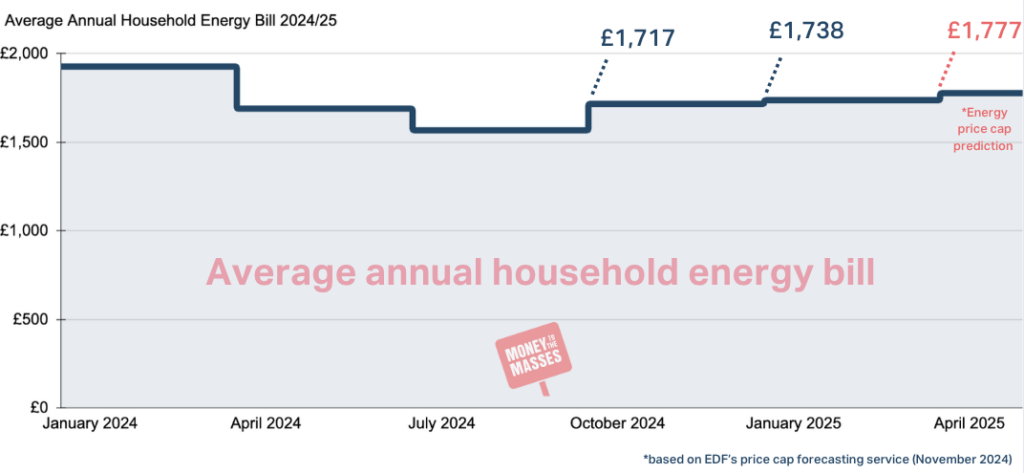 The energy price cap currently stands at £1,738 per year for the average dual-fuel household, following the latest Energy Price Cap rise on 1st January 2025. With winter in full swing, it leaves many wondering whether now is a good time to consider switching to a new fixed-price energy tariff.
The energy price cap currently stands at £1,738 per year for the average dual-fuel household, following the latest Energy Price Cap rise on 1st January 2025. With winter in full swing, it leaves many wondering whether now is a good time to consider switching to a new fixed-price energy tariff.
Ofgem, the energy regulator, makes quarterly changes to the energy price cap and as wholesale energy prices have finally started to stabilise in recent months, providers are starting to offer some competitive fixed-price energy deals, many of which come in cheaper than the current energy price cap.
Fixing your energy tariff could be a way for you to simplify your energy bills and also budget for the future, as you will know exactly what you will be paying over the fixed term. It does, however, come with the risk that you could end up paying more for your energy, if wholesale energy prices fall and so in this article, we take a look at the pros and cons of fixing your energy tariff as well as the things you should consider before switching to a new energy provider.
Is now the best time to fix my energy tariff?
Before considering whether now is a good time to fix your energy deal, it is worth taking a brief moment to understand how the energy price cap works.
Compare energy deals
Protect yourself against high energy rates by comparing energy deals with Uswitch
- Enter your postcode
- Compare energy deals
- Switch energy in minutes
Energy price cap explained
The energy price cap is set by the UK's independent energy regulator Ofgem. It aims to protect UK consumers from excessively high energy prices. The energy price cap is the maximum price that energy suppliers can charge per kilowatt per hour (kWh) and it applies to standard variable and default tariffs. The energy price cap is reviewed every quarter with the next change due on 1st January 2025. Importantly, the energy price cap does not apply to fixed energy tariffs, so it is essential to check you are getting a good deal before committing to a new fixed-price energy deal. In some circumstances, it may be possible to move from a fixed deal to a standard tariff, but it varies from provider to provider and some providers may charge an exit fee.
Latest energy price cap figures
Rather than concentrating on the actual kWh charges for electricity and gas, the energy price cap is usually expressed as an annual figure, based on the average dual-fuel household bill. The latest energy price cap figure currently stands at £1,738.
Thankfully, wholesale energy prices are not as volatile in recent months and the current energy price cap level means we no longer have to rely on government subsidies, such as the Energy Price Guarantee, in order to keep costs down.
What is a fixed energy tariff and how does it work?
A fixed price energy deal allows you to pay a set price for your gas and electricity. The price includes a fixed kWh charge for a unit of gas and electricity as well as a fixed daily standing charge (an amount paid daily no matter how much energy you use). Fixed-price energy deals usually last for a year, however, some suppliers allow you to lock in the price for longer. Most people choose to fix their electricity and gas prices with the same supplier, often referred to as a 'dual fuel' energy deal, however, customers are free to opt for different suppliers should they wish. Those who opt to pay by direct debit will usually receive a slightly discounted rate, meaning those who pay on receipt of the bill or via a prepayment meter will usually pay a little more.
Wholesale energy prices remained persistently high throughout much of 2022 and 2023, meaning many UK households simply chose to stay on their supplier's standard variable tariff, as the rate they paid was protected by the energy price cap. As we head into the winter there are an increasing number of priced energy tariff deals and we expect more to be released in the coming weeks. Check out our article 'What is the cheapest fixed-price energy tariff? - Best deals compared' for the latest fixed-price energy deals.
How long should I fix my energy bills for?
The energy price cap is currently set at £1,738, where it will stay until 31st March 2025. It is due to change on the 1st April 2025, with Ofgem due to confirm the figures around 22nd February. With continued uncertainty around energy prices, fixed energy tariffs could become attractive once again which leaves many wondering whether they should fix their energy tariff. The image below shows how the energy price cap has changed in recent months.
You can see from the image above that energy prices fell throughout the early part of 2024, however, they begin to rise in October 2024 and will rise again in January 2025. Fluctuating prices could make fixing your energy deal more attractive as you will have certainty over what you will be paying for your energy over a fixed term. There are, however, some considerations before committing to a new fixed-price energy tariff, which we explain below.
Latest Ofgem energy price cap figures: £1,738 for the average duel-fuel houseold (1st January 2025 to 31st March 2025).
Things to consider before fixing your energy tariff
1 - Check how much you currently pay
Before you switch energy providers you should take the time to understand exactly what you currently pay and what type of deal you are on. Check whether you are on your provider's default standard variable tariff or whether you are already in a fixed deal. Check how much you are being charged per kWh for gas and electricity and also note down your daily standing charge. Also check how you pay your bill as this can impact the price you currently pay. Do you pay by direct debit or on receipt of a bill or do you have a prepayment meter?
2 - What is the energy price cap and what is it predicted to be?
It is important to check the current energy price cap figures set by Ofgem and it is wise to keep an eye on what the future energy price cap is predicted to be. The energy price cap does not apply to fixed-price energy tariffs and so you should be confident that the deal you agree to is better than the current and expected energy price cap figures. This article is regularly updated with the latest energy price cap predictions, so bookmark this article for the latest predictions.
3 - How long should you fix your deal for?
Most fixed-price energy deals last for 12 months, however, some deals can last longer. If the price of electricity and gas continues to fall, fixing your tariff could mean that you miss out on some better deals in the future.
4 - Are there any exit fees?
It is wise to check for any exit penalties and fees. Exit fees only usually apply to those looking to exit their existing fixed-price deal before the agreed term is up. Most customers can switch from a provider's default standard variable tariff penalty free, however, you should always check to make sure.
Pros and cons of fixing your energy tariff
Below we consider the pros and cons of fixing your energy tariff.
Pros of fixing your energy tariff
- Protection from energy price increases
- Consistent bills can help with budgeting
- Peace of mind
Cons of fixing your energy tariff
- Potential to miss out on better deals in the future
- You may need to pay an exit fee for early cancellation if prices continue to fall
- Less flexibility
How to fix your energy tariff
Firstly, check how much you currently pay for your gas and electricity. It is likely that the price you currently pay is capped due to the energy price cap but it is worth checking your bill so that you know the price you'll need to beat when deciding whether you should fix your energy costs.
Next, keep an eye on energy price predictions and the latest energy price cap figures from Ofgem as this will ensure you are fully informed before you commit to a new energy deal.
Finally, use a comparison site or auto-switching service to compare the best fixed-price energy deals on the market and switch to a new seal. If there is a deal that beats what you are currently paying and is lower than the energy price cap, then you may want to consider switching to that deal. Most comparison sites allow you to switch online in just a few minutes and your new provider will deal with the cancellation via your old provider on your behalf. Keep in mind that if energy prices fall in the future, there may be better deals that come to the market in the coming months. Fixing your energy tariff will mean you are unlikely to be able to switch to a better deal during your fixed term, unless you pay a hefty exit penalty fee.
If you are unable to find a competitive fixed-price energy deal then there are other ways to bring down the cost of your energy. Check out our article 'How to save money on your energy bills' for tips on how to reduce your energy costs. If you are struggling to make ends meet then you may wish to check out our Cost of Living Guide as it provides a number of money-saving tips as well as an extensive look at the help that is available.






